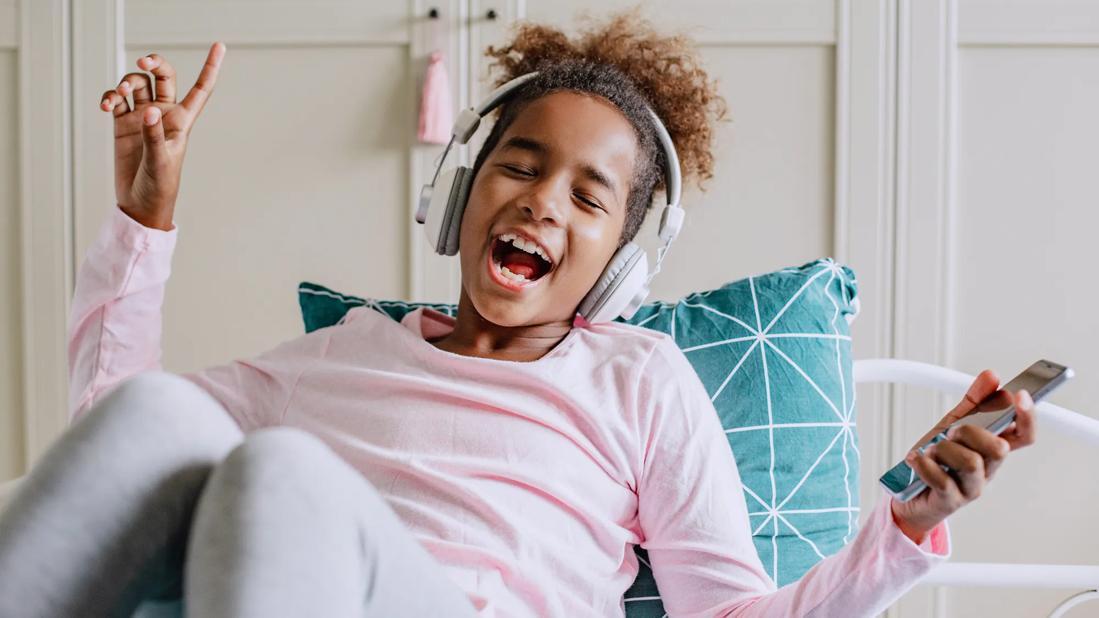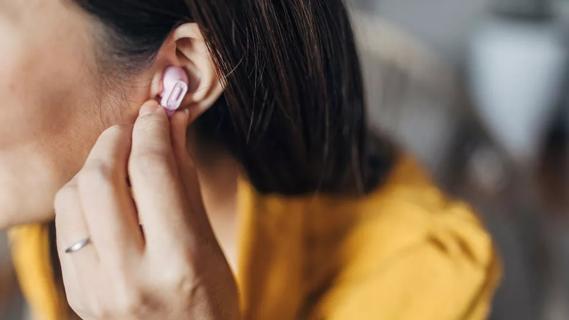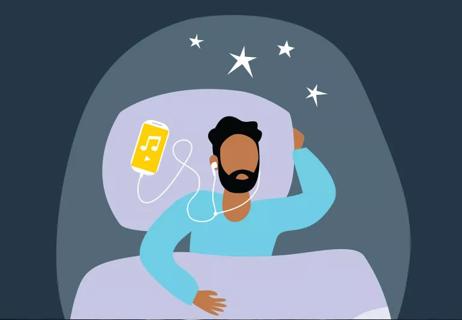Avoid poorly fitting gear, opt for quality devices and consider sound-limiting technology to help prevent noise-induced hearing loss

If you wonder whether your kid is listening to music too loud on their headphones, let’s solve that mystery: They probably are — and their hearing may be paying the price.
Advertisement
Cleveland Clinic is a non-profit academic medical center. Advertising on our site helps support our mission. We do not endorse non-Cleveland Clinic products or services. Policy
It’s estimated that 1 in 8 young people between the ages of 6 and 19 have hearing loss due to music blaring through earbuds or headphones. The numbers appear ready to worsen, too, as most children spend a few hours a day wearing audio devices.
So, how can young ears be protected while rocking out? Audiologist Valerie Pavlovich Ruff, AuD, has some ideas.
Video content: This video is available to watch online.
View video online (https://cdnapisec.kaltura.com/p/2207941/sp/220794100/playManifest/entryId/1_ajuwg1j0/flavorId/1_5f3sgelj/format/url/protocol/https/a.mp4)
The sounds of life come alive for you through the cochlea, a very sensitive organ in your inner ear. This spiral-shaped cavity contains two fluid-filled chambers lined with tiny hair cells that are topped with stereocilia, small hair-like structures that stimulate the hair cell.
Nerve endings in these hair cells convert sound waves into electronic signals that your brain “hears.” (This process is known as mechanoelectrical transduction.)
If you pound your ears with loud sounds, it takes a toll on this delicate mechanism. “These sensory cells can actually be injured by exposure to loud music or loud noise for too long,” says Dr. Ruff.
Repeated exposure to loud noise can cause irreparable damage over time. Overloaded ears age 50% faster than ears not pounded by sound. So, by the time you’re entering your 50s, you may have the hearing of someone in their 80s.
Advertisement
“You cannot just fix this cumulative damage,” she explains. “Those sensory cells will no longer allow you to hear at certain frequencies. They’re just gone.”
Signs of noise-induced hearing loss from earbuds, headphones or other loud sources include:
Sound intensity is measured in decibels (dB), a logarithmic scale showing exponential increases. In this system, a noise that increases from 80 dB to 90 dB is 10 times more intense for your ears and will seem about twice as loud.
When dialed up to max volume, smartphones and tablets can blare at up to 110 dB over headphones or earbuds — a sound intensity that can cause damage to ears in as little as five minutes.
“If you walk by someone and can hear what’s on their headphones, the sound is too loud,” says Dr. Ruff.
So, what’s safe for your ears? The World Health Organization (WHO) considers 80 dB the line for a safe listening environment over an eight-hour workday. (In the U.S., the Occupational Safety and Health Administration (OSHA) sets the standard at 85 dB.)
To put that in perspective, 80 dB is the noise level you’d expect in a crowded restaurant, while 85 dB equates to what you’d hear standing along a busy roadway.
As the dBs go up, the amount of time you can be safely exposed to the louder sound quickly drops, notes Dr. Ruff. An increase of 3 dB cuts your “safe” listening time in half — meaning your ears can only handle minutes when noise levels climb above 100 dB.
Now, the good news: Noise-induced hearing loss from headphones or earbuds is avoidable. “It is in our power to prevent this damage to our ears,” shares Dr. Ruff. “It just takes a little awareness and effort.”
Here are four ways to keep your hearing intact while using earbuds or headphones.
Every listening device includes volume controls. How you use them may help determine how well you hear in the future, as volume level and length of listening are the key factors in sound-induced hearing loss.
“If you’re listening at 50% to 60% of your max volume, you can probably safely listen to music most of the day,” says Dr. Ruff.
But if you turn the sound up, you’ll need to give your ears a break. A good rule of thumb is to limit your listening time to about 90 minutes if you have the volume set at about 80% of the maximum.
Earbuds that don’t fit in your ears very well tend to let in a lot of surrounding noise, which makes it tough to listen to your music or podcast. The same can be said for headphones that sit loosely over your ears.
Advertisement
What do you do in either case? Odds are, you turn up the volume to compensate. “That’s a formula to injury for the inner ear,” states Dr. Ruff.
Try to find noise-canceling earbuds that form a tight seal inside the ear canal to block out the surrounding sounds and allow you to keep the volume lower. Headphones should fit snugly over your ears.
A word of caution, though: Using “noise-canceling” devices means you might not hear important warning sounds like car horns if you’re out and about. These types of devices are best used when you’re in a secure setting.
Higher-quality headphones or earbuds typically provide a better sound. “That makes it less likely that you’ll rely on volume to enhance the fidelity,” says Dr. Ruff.
Both earbuds and headphones come in volume-limiting styles. These listening devices keep sound levels below the danger level, so they’re a great choice for anyone who tends to crank up the volume.
Various apps installed on listening devices can also keep noise levels at a safe level by limiting just how loud the volume can go.
“Any type of device that has a sound limiter is preferred,” notes Dr. Ruff.
It’s safe to say that headphone-wearing kids (or anyone, for that matter) don’t always think about their future hearing when they crank up the volume for their favorite song. It’s an instant gratification moment.
Advertisement
But those damaging habits will take a toll. That’s why it’s important to start building good listening habits early in life. Programs have begun to teach children how to limit noise-induced hearing loss.
“You get one set of ears in life and they can’t be replaced,” emphasizes Dr. Ruff. “If you’re using headphones or earbuds, it’s important to train yourself to listen to music at a softer level.”
By doing so, you increase your odds of enjoying those sounds for years to come.
Advertisement
Learn more about our editorial process.
Advertisement

This dangerous practice can cause burns or a ruptured eardrum, and can make earwax blockages worse

Care for your ears by steering clear of cotton swabs, taking precautions in loud settings and seeking medical help when needed

You can fall asleep while wearing headphones as long as you follow these tips

This spinning sensation is a symptom, not a condition, so you need to know what’s causing it before you can treat it

From playful movement to strength-building, kids need exercise to stay healthy and strong

Start weaning your toddler off daytime pacifier use by 12 months old to help prevent dental issues and speech delays

Combat summer learning loss and keep young brains engaged with low-pressure learning

It isn’t a recognized mental health disorder, but research shows that problematic social media use can negatively affect your mental health, self-esteem and sleep

Wearing a scarf, adjusting your outdoor activities and following your asthma treatment plan can help limit breathing problems

Your diet in the weeks, days and hours ahead of your race can power you to the finish line

When someone guilt trips you, they’re using emotionally manipulative behavior to try to get you to act a certain way